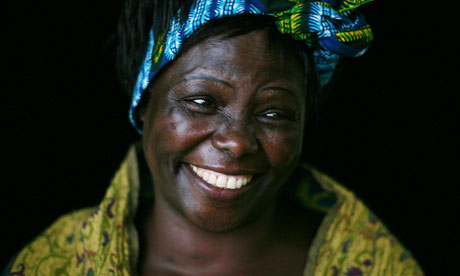Kenyan social activist and environmental crusader who founded the Green Belt Movement has died of cancer
Wangari Maathai, Nobel peace laureate at the Hay festival in 2007. Photograph: Martin Godwin for the Guardian
Wangari Maathai, the first African woman to win the Nobel peace prize, died on Sunday night of cancer. She was 71.
A towering figure in Kenya,
Maathai was renowned as a fearless social activist and an environmental
crusader. Her Green Belt Movement, which she founded in 1977, planted
tens of millions of trees.
Maathai's death was confirmed in a statement on the movement's website.
"It is with great sadness that the family of Professor Wangari
Maathai announces her passing away on 25 September 2011, at the Nairobi
hospital, after a prolonged and bravely borne struggle with cancer. Her
loved ones were with her at the time."
Maathai was a pioneer from an early age and in many spheres. After
winning a scholarship to study in the US, she returned to a newly
independent Kenya, becoming the first woman in east and central Africa to obtain a PhD. Maathai was also the first woman professor the University of Nairobi, where she taught veterinary medicine.
Her work with voluntary groups alerted her to the struggles of
women in rural Kenya, and it quickly became her life's cause. Noticing
how the rapid environmental degradation was affecting women's lives, she
encouraged them to plant trees to ensure future supplies of firewood
and to protect water sources and crops.
Maathai's agenda quickly widened as she joined the struggle against
the repressive and corrupt regime of Daniel arap Moi. Her efforts to
stop powerful politicians grabbing land, especially forests, brought her
into conflict with the authorities, and she was beaten and arrested
numerous times. Her bravery and defiance made her a hero in Kenya.
In awarding Maathai the Nobel peace prize in 2004, the Nobel committee said
that her "unique forms of action have contributed to drawing attention
to political oppression – nationally and internationally".
Maathai served as an assistant minister in President Mwai Kibaki's
government from 2003 to 2005, but her refusal to keep silent on some
issues saw her politically sidelined, and she lost her seat after a
single term. Her work schedule remained hectic however, and she wrote
several books and travelled widely.
Maathai had been in and out of hospital this year, though most
Kenyans were unaware of her illness until it was reported in the local
media late last week.
"Professor Maathai's departure is untimely and a very great loss to
all who knew her – as a mother, relative, co-worker, colleague, role
model, and heroine; or who admired her determination to make the world a
more peaceful, healthier, and better place," the statement from her
organisation said.
Maathai is survived by her three children and a granddaughter.
source internet
Labels: web source



0 Comments:
Post a Comment
Subscribe to Post Comments [Atom]
<< Home